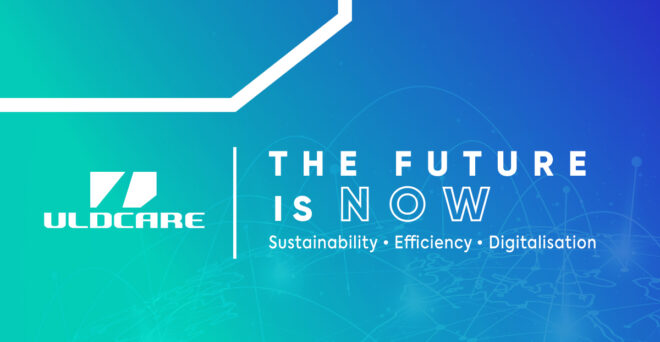Headline News, News, ULD CARE News, Conferences
Newsletter no 55 – November 2023
As we move into the last couple of months of 2023, ULD CARE is very pleased to be able to report on an extremely productive and successful year.
It goes, of course, without saying that seeing the pandemic fade into the past and travel resume, is a breath of fresh air to everybody. Although it has been partly offset by the decline in cargo volumes.
ULD CARE started off the year with a new administration and conference management person, Paryse Marchand, who has rapidly picked up the intricacies of running ULD CARE’s back office and also the challenge of putting on a very successful conference in Athens.
We are also delighted to welcome our latest member, Amazon Air, whose delegates Mr. Surya Elangovan and Mr. Karim Ismail attended this year’s conference.
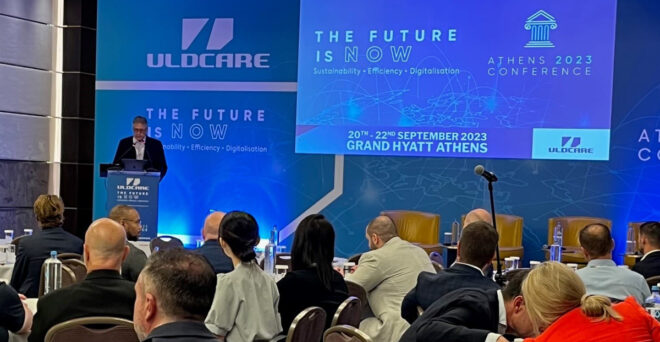
Speaking of the conference, this year saw an attendance of just over 100 delegates, of which 27 were from our airline members. We were also delighted to receive a great deal of positive feedback not only from our members but also from a number of industry heavyweights such as Glyn Hughes and Steven Polmans of TIACA, Alan Glen of Menzies and Henrik Ambak of Emirates Cargo. We also had two opportunities to showcase our digital initiatives. First, the E-UCR during the Air Cargo Handling innovation session. And, second, as part of the main introductory plenary for the entire multiorganisational conference. We could not have asked for better opportunities to bring the ULD conversation to the wider audience.
As those who were present at the event may recall, the conference content covered three main themes:
- Sustainability
- Safety
- Training
All linked under our headline digital initiative, the E-UCR. It therefore seems appropriate to use this final newsletter of the year to summarize where we are at in these four areas.
ANNUAL CONFERENCE 2023 ARCHIVESDigitalisation
High on the agenda of every player in the air cargo industry, it is widely accepted that for long-term sustainability, the industry must wean itself off its overdependence on legacy paper-based procedures. One such candidate is the 5-decades-old ULD Control Receipt (UCR). The UCR itself is still fit for purpose, despite its age, but using it in a paper-based format is archaic to say the least. Especially in today’s world where practically everything involves some kind of digitalisation.
Actually, having been the founder of the IULDUG system back in the 1970’s, a system which relies on the accurate recording and reporting of ULD transfer data, ULD CARE can justifiably claim to have a very long experience in running a digital system. Which actually sets us apart amongst the various industry associations.
The current status of the ULD CARE E-UCR project is that phase one has been completed and we were able to demonstrate in Athens a fully functional system. Complete with iOS and Android apps and a back office/management platform. We are currently running test programs with a number of airlines and, so far, receiving very positive feedback along with some excellent suggestions for enhancements that are based on real life operating experience. A roughly 30-minute video demonstrating the system at the conference can be seen here as well as a series of videos showing the system functions can be found on the following page: https://www.uldcare.com/uld-tools-and-solutions/e-ucr-app/
We are now at the point of embarking on phase 2 which will include the migration of the current IULDUG system into the new system. And are also adding a number of enhancements including dashboards for both cargo terminals and freight forwarders, offline use of the apps, 2-party verification of transfers and enhanced data export functions via API’s.
It is the ambition of ULD CARE to digitalise the entire process of ULD transfers between the different parties in the cargo ecosystem enabling all parties to enjoy the benefits of real-time reliable information and also play their part in driving a more efficient and sustainable ULD activity.
As we have already mentioned above, digitalisation is at the top of the wish list of every sector in this industry. ULD CARE is therefore very proud to be at the forefront in this field.
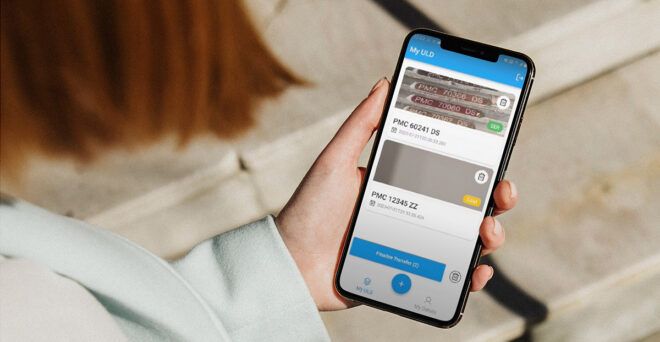
Sustainability
Sustainability is an undeniable imperative for the long-term survival of the air cargo industry. And ULD CARE is determined to be a driving force in this effort. Actually, it is fair to say that the industry has already done a great deal, most specifically in multiyear initiatives to reduce the tare weight of ULD. Ans this is already delivering enormous benefits to the airline industry. But on the other hand, there is a great deal of unnecessary waste, such as damage to containers pallets and nets, or losses of straps and spreader boards.
During the conference a number of very interesting ideas were put forward and we are now working to put in place a common platform to enable the efforts of the ULD community to be validated and given their due recognition.
Furthermore, one of the commonly identified concerns of the ULD community has to do with the cargo nets. Both the issue of the actual usable life of these items and also the challenge of managing some kind of sustainable disposal. In this regard, please refer to the linked document “Sustainability and Cargo nets”.
And following on from the discussions in Athens, we are pleased to announce that Ben Lakerveld of VRR is making a number of steps to turn ambitions to reality and he is looking for volunteers to join a small ULD CARE Sustainability task force. We cannot overemphasise how important sustainability is to our industry so, if you have any interest in this project, please send an email directly to Ben at ben@vrr.aero.
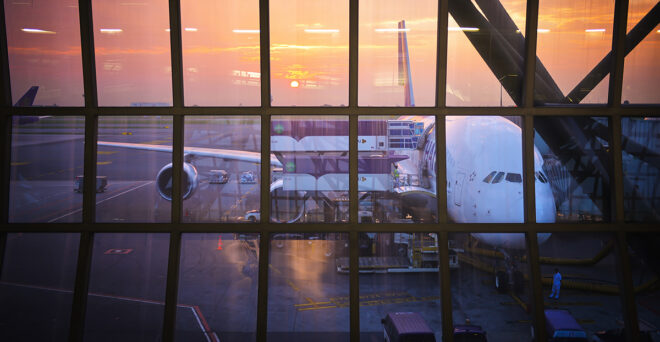
Training
There is no question that, across the entire airline industry (e.g., cargo and passenger operations) and across the entire support structure (such as cargo and baggage handlers, freight forwarders, etc), the levels of appropriate knowledge about proper use of ULD is severely lacking. And in recent years, this situation has become even more pressing given the shortage and high labour turnover that seems to have become endemic in this industry.
Over the past six years, ULD CARE has developed a number of on-line ULD trainings working with our partners Airport College. And we were particularly pleased to be able to announce the launch of a new ULD Awareness programme in Athens. Furthermore, Airport College has announced the ULD Training Challenge, whereby any airline selected to undertake the challenge will be provided with free access to the various Airport College ULD training courses. In return, they will measure and provide data on how they have experienced improvements in terms of reduced ULD damage over the subsequent 12 months. We will be providing updates on this program over the next 12 months.
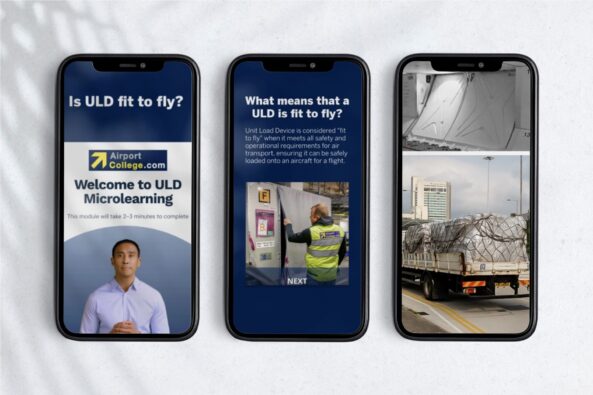
Safety
Safety is, of course, an inescapable aspect of ULD operations, and must always be taken extremely seriously. Lithium battery fires continue to be a major problem and it seems that a great deal of the heavy lifting when it comes to dealing with such fires is going to lie with the ULD. The investment by a number of our members in developing deliverable fire containment solutions is definitely to be commended. We have no doubt that this will continue to be an ongoing issue in years to come, hopefully without any serious accidents. At the same time, the increasingly widespread use of this safety equipment will require greater attention to both asset control and training, aligning with other ULD CARE initiatives.
Another safety area where ULD CARE is addressing is the proper use of spreader boards. While it is unlikely that the improper use of a spreader board will cause an immediate accident, there is plenty of evidence to show that over the long-term, improper spreading will lead to serious damage to the aircraft structure. Which will result in very considerable maintenance costs and potentially putting flight safety at risk. ULD CARE is therefore working to create a smart phone app that will enable operators to quickly calculate the required number and positioning of spreader boards for any particular piece of heavy cargo.
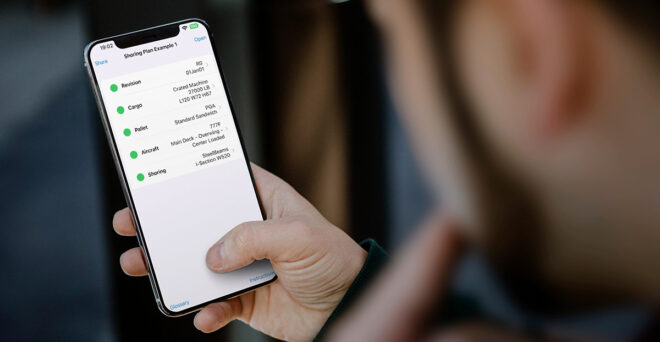
Sustainability, Training and Safety are three components of ULD CARE’s vision of continuously delivering improved ULD operations. And digitalisation is the glue that can bind these three components together as widespread adoption of the digital E-UCR will bring a whole new level of accountability and responsibility for ULD operations. Which will benefit all stakeholders across the air cargo industry.

